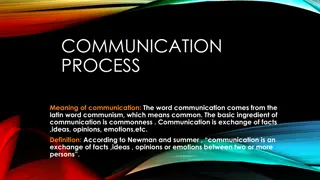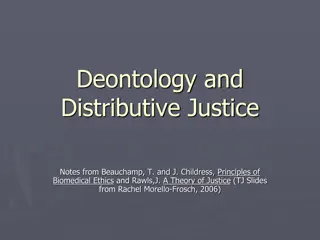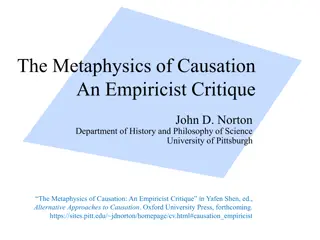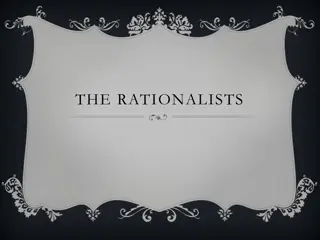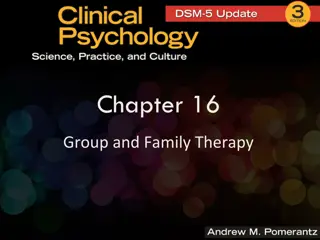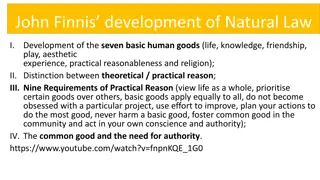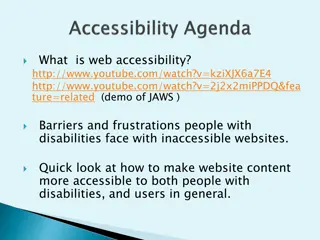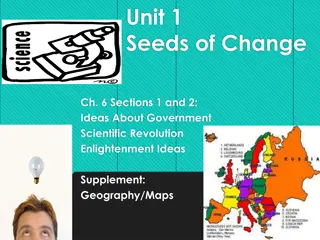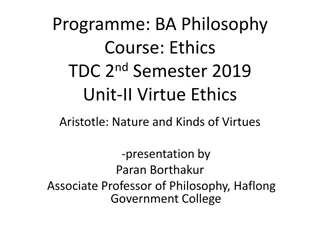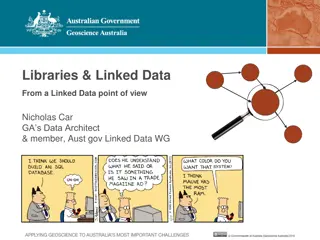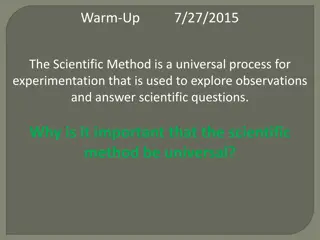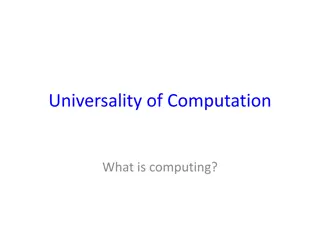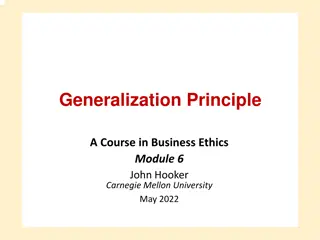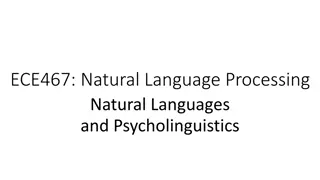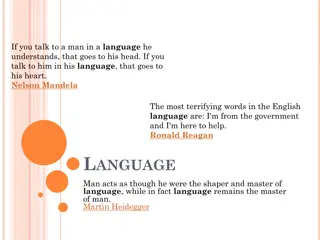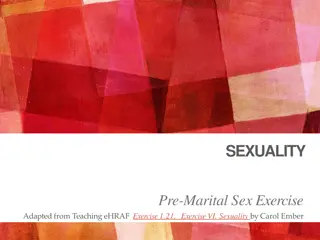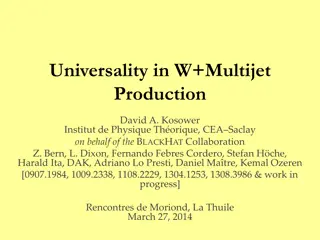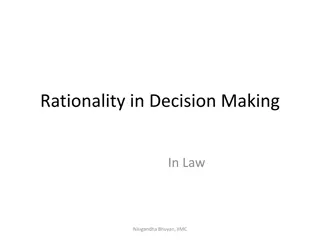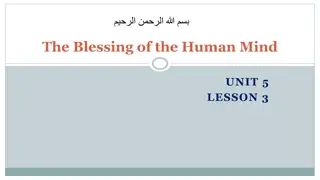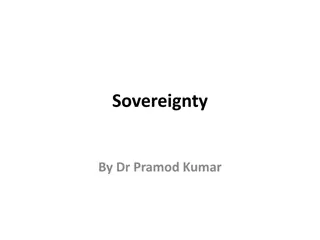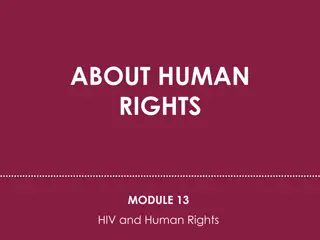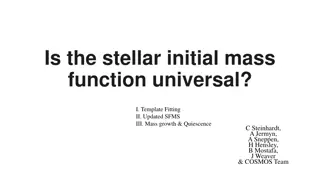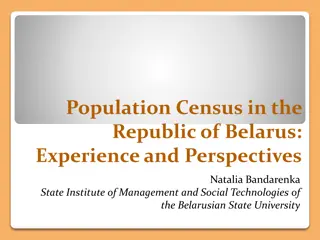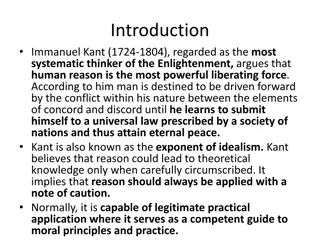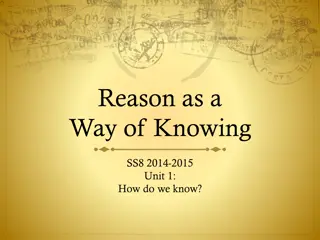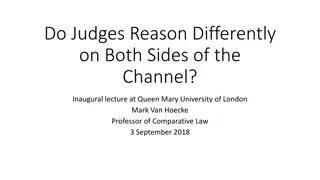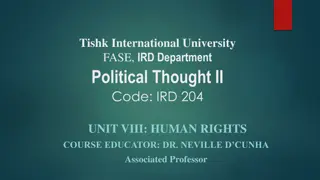Understanding the Communication Process: Key Concepts and Characteristics
Communication is the exchange of information, ideas, and emotions between two or more individuals. It is a process involving a source, encoding of messages, communication channels, receivers, decoding of messages, feedback, and potential noise. Important characteristics include the involvement of at
1 views • 8 slides
Understanding Deontology and Distributive Justice in Ethics
Deontology, originating from the Greek words for duty and study of, focuses on morally required, forbidden, or permitted choices. It emphasizes obedience to duty and opposes utilitarianism, prioritizing what is morally right over the overall good. Unlike virtue theories, deontology assesses moral ob
2 views • 32 slides
Critique of Causal Metaphysics and Empiricism
In this content, the author critiques the metaphysics of causation from an empiricist perspective, exploring the limitations of empiricism in understanding the contingent truths of the world. It discusses causal antifundamentalism, various forms of skepticism, including Humean skepticism, and challe
4 views • 55 slides
Understanding the Core Principles of the 2030 Agenda for Sustainable Development
Explore the key features and principles of the 2030 Agenda for Sustainable Development with a focus on its core principles of Universality, Leaving No One Behind, Interconnectedness and Indivisibility, Inclusiveness, and Multi-stakeholder Partnerships. This comprehensive agenda encompasses 17 Sustai
5 views • 11 slides
Understanding Rationalism and Self-Made Americans in Historical Context
Rationalism is the belief in arriving at truth through reason rather than authority or intuition. Rationalists view God as a distant creator who doesn't interfere with the universe's workings. They believe in progress towards a better existence and worship by helping others. Meanwhile, self-made Ame
0 views • 9 slides
Therapeutic Factors in Group Therapy: Enhancing Interpersonal Relationships
Explore the therapeutic factors in group therapy that focus on enhancing interpersonal relationships, instilling hope, promoting universality, and fostering group cohesiveness. Through interactions with fellow group members, clients can improve their interpersonal skills and generalize lessons learn
0 views • 29 slides
The Cultural Evolution from Coffee Houses to the Internet in the Age of Reason
The presentation explores the transition from coffee houses as hubs of intellectual exchange to the internet for accessing news and discussions. It delves into the Age of Reason, discussing figures like John Locke and the concepts of civility, moderation, and the role of women in cultural life.
0 views • 13 slides
Understanding Political Theory through a Contextual Approach
Exploring G.H. Sabine's perspective on political theory through a contextual approach, emphasizing the importance of historical context and societal influences. Sabine argues that while political theory evolves with its contemporary politics, it should be analyzed within its specific time and social
0 views • 9 slides
Understanding the 2030 Agenda for Sustainable Development
The 2030 Agenda for Sustainable Development emphasizes the importance of not cherry-picking goals, but instead assessing interlinkages across targets. It consists of 17 goals addressing various global challenges such as poverty, inequality, gender equality, climate change, and sustainable developmen
5 views • 10 slides
John Finnis' Development of Natural Law and Basic Human Goods
John Finnis' theory of natural law focuses on the development of seven basic human goods, including life, knowledge, friendship, play, aesthetic experience, practical reasonableness, and religion. He emphasizes the distinction between theoretical and practical reason, outlines nine requirements of p
0 views • 14 slides
Understanding Web Accessibility and Inclusive Design
Web accessibility ensures that everyone, regardless of disability, can access and interact with websites. This includes considerations for visual, hearing, motor, and cognitive impairments. Making websites accessible involves providing alternatives for multimedia content, clear structure, and readab
0 views • 17 slides
Seeds of Change: Government, Science, and Enlightenment in European History
Explore the evolution of government, scientific revolution, and Enlightenment ideas in Europe through monarchies, the Scientific Revolution's impact on society, and the Age of Reason. Uncover the shift towards questioning authority and the pursuit of logic and reason. Delve into the significance of
0 views • 22 slides
Aristotle's Virtue Ethics: The Nature and Kinds of Virtues
Aristotle's virtue ethics discusses the nature of virtues as a disposition unique to humans that enables them to function well according to reason. Virtue involves finding the mean between excess and deficiency, not endorsing mediocrity. It emphasizes that virtues are acquired through habitual pract
1 views • 18 slides
Understanding Linked Data: Building a Semantic Web Ecosystem
Explore the world of Linked Data from the perspective of Nicholas Car, a data architect and member of Aust.gov Linked Data WG. Uncover the significance of Linked Data, its role in evolving the web into a global data space, and the Australian Govt. Linked Data Working Group's initiatives. Dive into i
0 views • 47 slides
Exploring the Relationship Between Faith and Reason in Catholic Beliefs
Understanding the theological virtue of faith and the capacity for reasoning in the context of Catholic teachings. Explore the tension between faith and reason, and the differing perspectives from secular critics and faith-based individuals on the role of faith and reason in society.
0 views • 19 slides
The Significance of the Scientific Method in Research
The scientific method is a crucial universal process that guides scientists in exploring observations and answering questions through a set of sequential steps. It starts with asking a question, conducting research, stating a hypothesis, designing and conducting an experiment, collecting data, and f
0 views • 18 slides
Insights into the Enlightenment Thinkers: Philosophers of Change
The Enlightenment era marked a shift towards reason and enlightenment, with thinkers like Locke, Hobbes, Montesquieu, Rousseau, and Voltaire advocating for progress, natural law, and individual rights. Each philosopher contributed unique ideas to reshape societal structures, challenging traditional
0 views • 18 slides
Understanding Canine Attachment and Cross-Species Relationships
Dogs exhibit strong social attachment to humans, forming enduring bonds that serve as a secure base. This attachment benefits both organisms, providing resources for survival and establishing social structures. Imprinting studies suggest that animals, like humans, develop proximity-seeking behaviors
0 views • 29 slides
Exploring the Red Cross & Red Crescent Movement
Delve into the history, principles, and role of Red Cross and Red Crescent volunteers. Discover the seven principles guiding their actions, the significance of emblems, and the vital role they play in communities worldwide. Learn about the humanitarian values of humanity, impartiality, neutrality, i
0 views • 16 slides
Para Table Tennis Tokyo 2020 Qualification Criteria & Program Overview
The Para Table Tennis Tokyo 2020 Qualification Criteria include athlete performance, universality, and team event viability. The Table Tennis in Paralympic Program features various sports events, with Tokyo 2020 hosting a total of 31 medal events for 146 athletes. The International Table Tennis Fede
0 views • 15 slides
Overview of Universality and Church-Turing Hypothesis
The universality of computation encompasses physical and mathematically defined computation, along with the concept of Turing machines and universal computers. The Church-Turing Hypothesis posits that everything computable can be computed by a Turing machine. The modern interpretation extends this t
0 views • 27 slides
Understanding the Sustainable Development Goals (SDGs)
The Sustainable Development Goals (SDGs) are a set of 17 goals aimed at shaping the world's future by 2030. These goals are backed by 169 detailed targets and were negotiated and agreed upon by nations worldwide. The SDGs emphasize universality, integration, and transformation, highlighting the need
1 views • 27 slides
Understanding Ethical Principles and Acting for Reasons
Ethical principles are crucial for objective decision-making, preventing rationalization. The Generalization Principle emphasizes the need for rationale in actions. The Universality of Reason asserts that rationality is independent of personal identity. Acting for Reasons theory underscores that eve
0 views • 41 slides
Language Development and Universality Explained Through Natural Language Processing
Chomsky's theory of Universal Grammar suggests an innate set of linguistic principles shared by all human languages, allowing children to learn language rapidly. Pinker's work delves into the existence and development of pidgins and creole languages, showcasing how languages evolve in unique circums
0 views • 18 slides
Insights into Language: Communication, Creativity, and Universality
Explore the profound impact of language on human interaction, as reflected in quotes from Nelson Mandela, Ronald Reagan, and Martin Heidegger. Discover the complexity of language through examples like counting Fs, questions on word interpretation, and the importance of language as a system of commun
0 views • 36 slides
Exploring Cross-Cultural Perspectives on Premarital Sexuality
Societies worldwide exhibit diverse attitudes towards premarital sexual relations. This teaching exercise delves into examining five distinct social perspectives on premarital sex, challenging notions of universality in human sexual behaviors, and honing effective search strategies within the Human
0 views • 15 slides
Challenges and Solutions in High-Multiplicity Jet Production Studies
Theory and methodology challenges in the universality and production of W+multijet events are discussed, emphasizing the importance of accurate predictions and scale independence. The NLO revolution and on-shell methods are explored, along with software tools like BLACKHAT and SHERPA. Managing compu
0 views • 14 slides
Voice-Induced Vowel Lengthening in Phonology Research
Exploring the phenomenon of voice-induced vowel lengthening, this research delves into spontaneous vs. non-spontaneous voicing patterns and the documented transmission of voicing from vowels/sonorants to voiceless obstruents. The study discusses various theories on voice transmission from sonorants/
2 views • 35 slides
Exploring the Ambiguity of Reason in Philosophy Through Historical Perspectives
The ambiguity and complexity surrounding the concept of reason are delved into through the historical lenses of John Broome and David Hume. From the early uses of "reason" in English to its normative implications in moral philosophy, this exploration sheds light on the multifaceted nature of reason
0 views • 21 slides
Rationality in Decision Making: Exploring Law and Philosophy
Explore the concept of rationality in decision making as applied to law and philosophy, examining the role of reason, economics, psychology, and the rule of law. Delve into the conceptions of rationality in law and the importance of applying reason to ensure good governance and political legitimacy.
0 views • 17 slides
The Blessing of the Human Mind: Reflections on Utilizing the Gift of Reason in Daily Life
Explore the profound impact of the human mind as a divine gift in enhancing relationships with Allah, fellow human beings, creatures, and oneself. Discover the wisdom behind the revelation of the Holy Qur'an, the role of reason in making wise choices, and the importance of using the mind for benefic
0 views • 15 slides
Understanding Sovereignty: Origins, Definitions, and Characteristics
The concept of sovereignty traces back to Aristotle, evolving through key figures like Jean Bodin and Hugo Grotius. Defined by supreme power over citizens, sovereignty exhibits permanence and universality in the context of state authority. Explore its roots, meanings, and enduring features in politi
0 views • 23 slides
Understanding Human Rights and Their Importance in Society
Explore the concept of human rights and their significance through the lens of HIV and other critical issues. Learn about the fundamental principles of human rights, their universality, indivisibility, and interdependence. Discover how equality, non-discrimination, participation, inclusion, accounta
0 views • 11 slides
Understanding the Stellar Initial Mass Function Variability
Investigating the universality of the stellar initial mass function (IMF) through template fitting and updated star-forming main sequence studies. Variable IMF models, template fitting with SED templates, and implications for star formation processes are discussed, highlighting the interplay between
0 views • 12 slides
Population Census in the Republic of Belarus: History, Principles, and Significance
The Population Census in the Republic of Belarus has a rich history, with nine previous counts conducted since 1897. This census provides essential demographic data, including information on sex, age, nationality, education, marital status, and more. The census program in Belarus is based on fundame
0 views • 26 slides
Kant's Moral Philosophy: Reason, Freedom, and the State
Immanuel Kant, a prominent Enlightenment thinker, emphasizes the liberating power of human reason in guiding individuals towards moral principles and practices. Kant's moral philosophy centers on treating each person as an end-in-itself, driven by the good will informed by reason. His concept of mor
0 views • 14 slides
Three-Body Recombination in Ultracold Atoms: Studies and Observations
Investigating three-body recombination in ultracold atoms, this study explores the Efimov scenario, experimental setups with ultracold 7Li atoms, and the implications of three-body inelastic collisions. The research delves into universality windows, real molecule comparisons, and the loss rate from
0 views • 35 slides
Exploring Reason as a Way of Knowing
Reason, a fundamental way of understanding the world, involves logic, comparison, judgment, and experience. This unit delves into how reason impacts individuals and societies, the varying quality levels of reasoning, and the relevance of reason in different contexts. Discussions center on the import
0 views • 5 slides
Contrasting Legal Reasoning in Common Law and Continental Law Systems
This inaugural lecture explores the differences in legal reasoning between judges on both sides of the English Channel. It delves into the declaratory theory of decision-making in Common Law and the application of legislative intent in Continental Law. The lecture also touches on the contrasting ind
0 views • 48 slides
Understanding Human Rights: Intersection with International Law
Exploring the concept of human rights, this course delves into the diverse aspects of civil, political, social, economic rights, and their intersection with international law. Covering historical perspectives, philosophical roots, and contemporary implications, it emphasizes the universality, indivi
0 views • 18 slides
